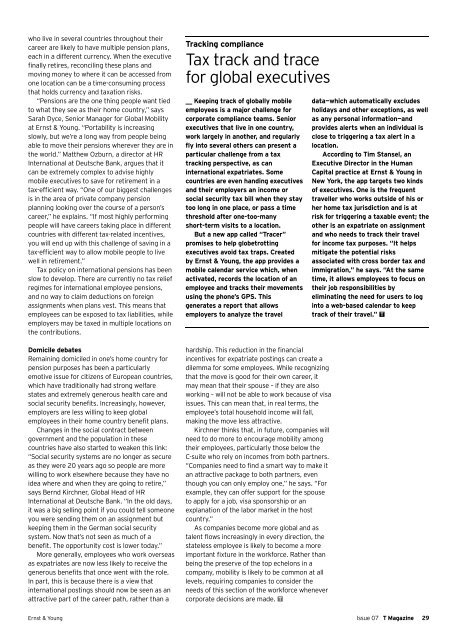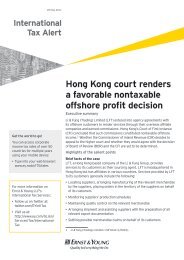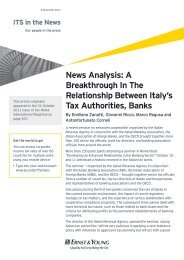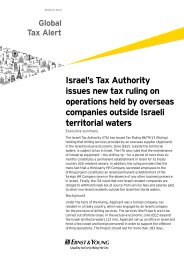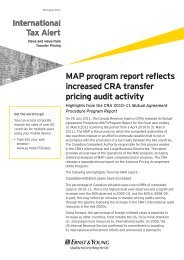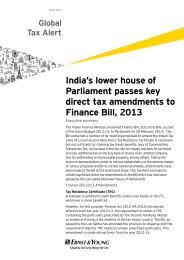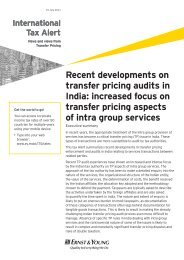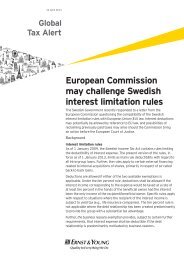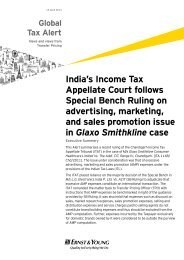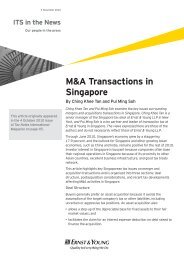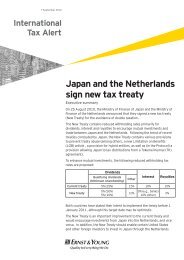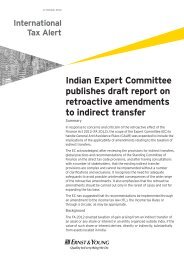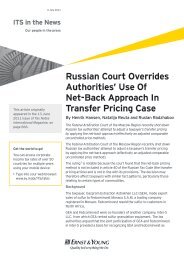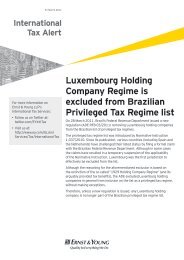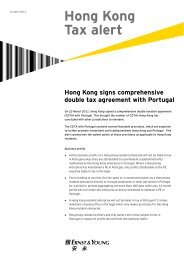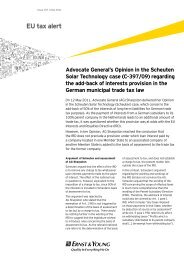Download - Ernst & Young T Magazine
Download - Ernst & Young T Magazine
Download - Ernst & Young T Magazine
Create successful ePaper yourself
Turn your PDF publications into a flip-book with our unique Google optimized e-Paper software.
who live in several countries throughout their<br />
career are likely to have multiple pension plans,<br />
each in a different currency. When the executive<br />
finally retires, reconciling these plans and<br />
moving money to where it can be accessed from<br />
one location can be a time-consuming process<br />
that holds currency and taxation risks.<br />
“Pensions are the one thing people want tied<br />
to what they see as their home country,” says<br />
Sarah Dyce, Senior Manager for Global Mobility<br />
at <strong>Ernst</strong> & <strong>Young</strong>. “Portability is increasing<br />
slowly, but we’re a long way from people being<br />
able to move their pensions wherever they are in<br />
the world.” Matthew Ozburn, a director at HR<br />
International at Deutsche Bank, argues that it<br />
can be extremely complex to advise highly<br />
mobile executives to save for retirement in a<br />
tax-efficient way. “One of our biggest challenges<br />
is in the area of private company pension<br />
planning looking over the course of a person’s<br />
career,” he explains. “If most highly performing<br />
people will have careers taking place in different<br />
countries with different tax-related incentives,<br />
you will end up with this challenge of saving in a<br />
tax-efficient way to allow mobile people to live<br />
well in retirement.”<br />
Tax policy on international pensions has been<br />
slow to develop. There are currently no tax relief<br />
regimes for international employee pensions,<br />
and no way to claim deductions on foreign<br />
assignments when plans vest. This means that<br />
employees can be exposed to tax liabilities, while<br />
employers may be taxed in multiple locations on<br />
the contributions.<br />
Domicile debates<br />
Remaining domiciled in one’s home country for<br />
pension purposes has been a particularly<br />
emotive issue for citizens of European countries,<br />
which have traditionally had strong welfare<br />
states and extremely generous health care and<br />
social security benefits. Increasingly, however,<br />
employers are less willing to keep global<br />
employees in their home country benefit plans.<br />
Changes in the social contract between<br />
government and the population in these<br />
countries have also started to weaken this link:<br />
“Social security systems are no longer as secure<br />
as they were 20 years ago so people are more<br />
willing to work elsewhere because they have no<br />
idea where and when they are going to retire,”<br />
says Bernd Kirchner, Global Head of HR<br />
International at Deutsche Bank. “In the old days,<br />
it was a big selling point if you could tell someone<br />
you were sending them on an assignment but<br />
keeping them in the German social security<br />
system. Now that’s not seen as much of a<br />
benefit. The opportunity cost is lower today.”<br />
More generally, employees who work overseas<br />
as expatriates are now less likely to receive the<br />
generous benefits that once went with the role.<br />
In part, this is because there is a view that<br />
international postings should now be seen as an<br />
attractive part of the career path, rather than a<br />
Tracking compliance<br />
Tax track and trace<br />
for global executives<br />
__ Keeping track of globally mobile<br />
employees is a major challenge for<br />
corporate compliance teams. Senior<br />
executives that live in one country,<br />
work largely in another, and regularly<br />
fly into several others can present a<br />
particular challenge from a tax<br />
tracking perspective, as can<br />
international expatriates. Some<br />
countries are even handing executives<br />
and their employers an income or<br />
social security tax bill when they stay<br />
too long in one place, or pass a time<br />
threshold after one-too-many<br />
short-term visits to a location.<br />
But a new app called “Tracer”<br />
promises to help globetrotting<br />
executives avoid tax traps. Created<br />
by <strong>Ernst</strong> & <strong>Young</strong>, the app provides a<br />
mobile calendar service which, when<br />
activated, records the location of an<br />
employee and tracks their movements<br />
using the phone’s GPS. This<br />
generates a report that allows<br />
employers to analyze the travel<br />
hardship. This reduction in the financial<br />
incentives for expatriate postings can create a<br />
dilemma for some employees. While recognizing<br />
that the move is good for their own career, it<br />
may mean that their spouse – if they are also<br />
working – will not be able to work because of visa<br />
issues. This can mean that, in real terms, the<br />
employee’s total household income will fall,<br />
making the move less attractive.<br />
Kirchner thinks that, in future, companies will<br />
need to do more to encourage mobility among<br />
their employees, particularly those below the<br />
C-suite who rely on incomes from both partners.<br />
“Companies need to find a smart way to make it<br />
an attractive package to both partners, even<br />
though you can only employ one,” he says. “For<br />
example, they can offer support for the spouse<br />
to apply for a job, visa sponsorship or an<br />
explanation of the labor market in the host<br />
country.”<br />
As companies become more global and as<br />
talent flows increasingly in every direction, the<br />
stateless employee is likely to become a more<br />
important fixture in the workforce. Rather than<br />
being the preserve of the top echelons in a<br />
company, mobility is likely to be common at all<br />
levels, requiring companies to consider the<br />
needs of this section of the workforce whenever<br />
corporate decisions are made.<br />
data—which automatically excludes<br />
holidays and other exceptions, as well<br />
as any personal information—and<br />
provides alerts when an individual is<br />
close to triggering a tax alert in a<br />
location.<br />
According to Tim Stansel, an<br />
Executive Director in the Human<br />
Capital practice at <strong>Ernst</strong> & <strong>Young</strong> in<br />
New York, the app targets two kinds<br />
of executives. One is the frequent<br />
traveller who works outside of his or<br />
her home tax jurisdiction and is at<br />
risk for triggering a taxable event; the<br />
other is an expatriate on assignment<br />
and who needs to track their travel<br />
for income tax purposes. “It helps<br />
mitigate the potential risks<br />
associated with cross border tax and<br />
immigration,” he says. “At the same<br />
time, it allows employees to focus on<br />
their job responsibilities by<br />
eliminating the need for users to log<br />
into a web-based calendar to keep<br />
track of their travel.”<br />
<strong>Ernst</strong> & <strong>Young</strong> Issue 07 T <strong>Magazine</strong> 29


